Relearning about Keio University and Yukichi Fukuzawa(3)
03: Learning about Yukichi Fukuzawa in Class
Fukuzawa Memorial Center for Modern Japanese Studies Course—“Modern Japan and Yukichi Fukuzawa 1” (Professor Naoko Nishizawa and Associate Professor Takeyuki Tokura)
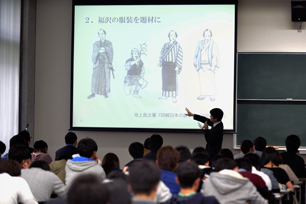
As there is an abundance of humorous episodes in the book The Autobiography of Yukichi Fukuzawa, which is distributed to all new students on admission to Keio University, the more we learn about Fukuzawa the more he ignites our curiosity. The course “Modern Japan and Yukichi Fukuzawa 1” (Spring Semester/Hiyoshi Campus) explores Fukuzawa’s philosophy and principles and the role of Keio University by looking at his life and the history of the university, incorporating numerous photographs and interesting stories from that time.

“Fukuzawa decided to remain in the private domain from where he expressed his ideas to and at times made criticisms against the Japanese government. Although he vacillated between idealism and realism, he firmly held to the principle of bettering Japanese society with an excellent sense of balance. Although it was understood that joining Keio would disadvantage students who wanted to pursue a career as a government official, the school still attracted a great many people who had grand ideals for the future of Japan. In this respect, I would like Keio students to feel proud that they are connected with this history.”
(Associate Professor Takeyuki Tokura, Fukuzawa Memorial Center for Modern Japanese Studies)


“Fukuzawa foresaw then what is apparent to us now in this globalizing world, and although his ideas and opinions must have come under intense pressure, he still went ahead and put them into practice. I would like to know more about what Fukuzawa thought and what he accomplished during the Meiji period when Japan was going through a dramatic transition.”
(Akito Ogawa, first-year student, Faculty of Economics)
“Because I am involved in debating in English, I became interested in Fukuzawa when I found out that he introduced Western-style public speech in Japan. I feel that I can identify with Fukuzawa who went about doing things without worrying about what other people think, and he gives me a lot of courage.”
(Mei Kurata, first-year student, Faculty of Economics)
Learning about Yukichi Fukuzawa in Other Classes and the Stone Monument
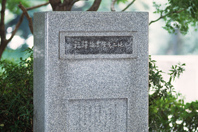
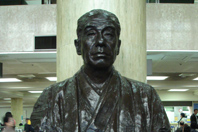
Other classes that teach students about Yukichi Fukuzwa include “Introduction to Keio Gijuku, its History, People and Tradition” (Spring Semester), which is offered on Shonan Fujisawa Campus. This course is designed for first-year students to give them the opportunity to think about the significance of studying and leading a student life at Keio. It is a series of lectures on Keio University and Fukuzawa delivered by Keio faculty members and experts from outside the university. Besides these lectures, there are many other classes and seminar classes that touch on Yukichi Fukuzawa.
In addition to the classes, to the east of the Keio University Library (New Building) on Mita Campus, is a monument marking the general area where Fukuzawa’s house once stood and where he spent his final days. Why don’t you visit the stone monument or the bronze busts of Fukuzawa erected on Mita, Hiyoshi, SFC, and Shinanomachi Campuses and reflect on the life of Keio University founder, Yukichi Fukuzawa?
04: Learning More about Keio University and Yukichi Fukuzawa
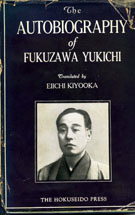
The more we learn about Yukichi Fukuzawa and the history of Keio, the more it ignites our curiosity to study and learn more. Fukuzawa left behind a vast amount of literature; for example, the Fukuzawa Zenshū (The Collected Works of Fukuzawa, 1898) alone has four different versions. In this feature we will introduce three of his most famous works that can be easily obtained. There are also books that come in paperback or have been translated into modern Japanese, so we suggest you find a book that matches your interests.
■An Encouragement of Learning
This Meiji period bestseller begins with the words: “It is said that heaven does not create one man above or below another man. Any existing distinction between the wise and the stupid, between the rich and the poor, comes down to a matter of education.” The book is comprised of a series of 17 pamphlets published between 1872 and 1876. Written in an easy-to-read colloquial style that was ground-breaking for that time, Fukuzawa talked about freedom and independence of the people, and in order to achieve this, advocated the importance of jitsugaku [practical learning] to build empirical and logical minds. This book embodies his strong determination to break down conservative ideas, and it served as a powerful stimulus for Japanese society that had just entered the so-called period of “civilization and enlightenment.”
■The Autobiography of Yukichi Fukuzawa
This is in a sense an introductory book on Fukuzawa. Born as the second son to a low-ranking samurai family, his pledge to take revenge against the class system was always at the base of his beliefs: “To me, indeed, the feudal system is my father’s mortal enemy which I am honor-bound to destroy.” During his life, he encountered Dutch studies, travelled to Europe and North America three times, established Keio, and founded and managed the Jiji Shimpo newspaper. Fukuzawa made repeated revisions and additions to the book, and the result is a vivid account of his eventful life told through his own words in prose style. The book is also an important historical document of the late Edo to the Meiji era. It is a valuable source for exploring how Fukuzawa’s life and philosophy developed at a critical crossroad in Japanese history, the Meiji Restoration.
■An Outline of a Theory of Civilization
Published in 1875, not only is the book one of Fukuzawa’s representative works, it is also considered a classic of modern Japanese literature written on the theory of civilization of the East and West. Fukuzawa discusses the essence of Western civilization and advocates that the only way to achieve Japan’s independence is by advancing civilization through Westernization. Fukuzawa used a more serious tone compared to An Encouragement of Learning so that the book would be read by conservative intellectuals who were devoted to the teachings of Confucius and lead them to understand the importance of instilling Japanese society with the spirit of Western civilization.
05: Various Initiatives at Keio’s Affiliated Schools
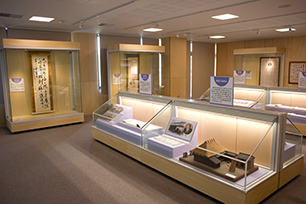
There are various opportunities to learn about Yukichi Fukuzawa and Keio University at the affiliated schools. For example, at Keio Yochisha Elementary School, a 36 km charity walk has been held every year since 1988 with members of the walking club and 6th-grade volunteers. Last year there were over 100 participants who took almost 11 hours to walk the route that Fukuzawa actually took to travel from Tsukiji to Yokohama by foot. Also, at Keio Yokohama Elementary School there is the Yukichi Fukuzawa Museum, where pupils can delve into Fukuzawa's life and the history of Keio.
